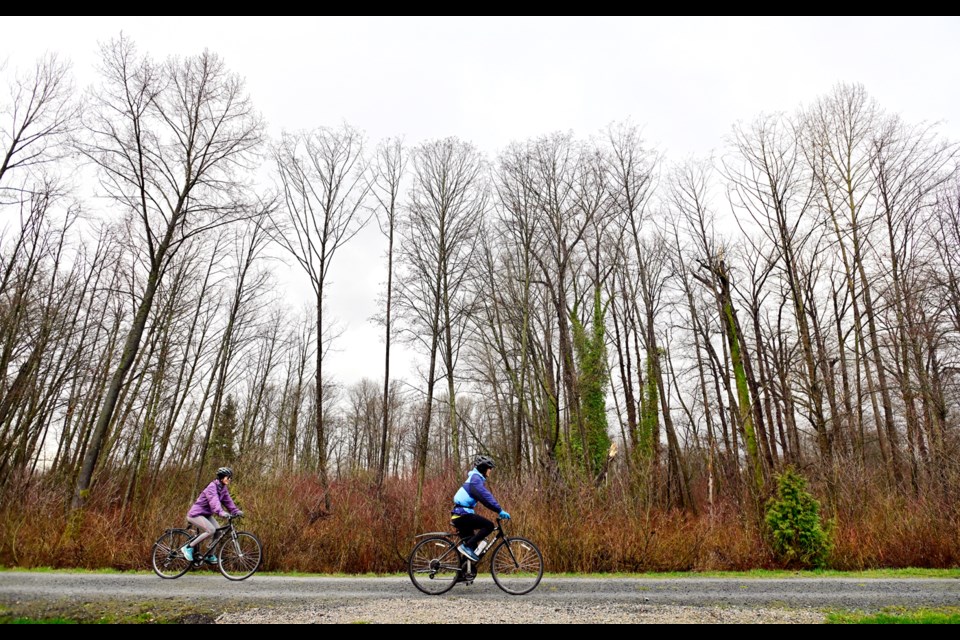Update: This article has been updated to include decisions and comments from city councillors at the regular council meeting on Feb. 27.
Burnaby residents can officially have their say regarding a city proposal to remove 21 acres of parkland at Fraser Foreshore Park to make way for a proposed green waste processing plant.
Council unanimously approved launching a voting process in which residents can formally mark their opposition to the “green recycling and organics” (GRO) project.
It comes after council approved next steps on the proposed $182-million facility, which the city says would strengthen its commitment to long-term sustainability and reduce its greenhouse gas emissions.
Still, the proposal has drawn criticism from environmentalists and residents concerned about removing the park’s sensitive wetland habitat.
Removing the park dedication requires voter approval, so the city chose to pursue an “alternative approval process” (AAP), a voting method in which a local government measures “whether the community views a particular matter as ‘significant,’” according to a staff report up at council on Feb. 27.
All eligible voters living in Burnaby will be able to participate, as well as non-resident property electors. The report indicates a total of 162,503 eligible Burnaby voters.
Voters opposed to the proposal must sign and submit an elector response form to the city by 4 p.m. on April 28. The form will be available on Thursday, March 2 at 8 a.m. at the following locations:
- Burnaby City Hall at the legislative services department (4949 Canada Way)
- Online for self-printing and delivery (available on March 2 at 8 a.m.)
The form will be also available on March 2 at 10 a.m. at all Burnaby Public Library locations:
- Bob Prittie Metrotown (6100 Willingdon Ave.)
- Edmonds Tommy Douglas (7311 Kingsway)
- Cameron (9523 Cameron St.)
- McGill (4595 Albert St.)
Forms must be submitted by the deadline to Burnaby’s legislative services department by mail, in person, or one of the 24-hour drop boxes (cleared daily) at both entrances to Burnaby City Hall.
Only opposed voters need to submit the response form; voters in favour of the project do not need to take any action, according to the staff report.
If the city receives 16,250 responses, or 10 per cent of the electorate, council will not be able to undedicate the parkland.
“An alternative approvals process is the consent from the electorate,” said the city’s corporate officer and director of legislative services, Nikki Best, at the council meeting on Feb. 27. “If the electorate of more than 10 per cent responds in opposition to this project, it will not proceed.”
“There’s no intention to go to referendum,” Best told the NOW after the council meeting.
If the number of responses is fewer than 10 per cent of the electorate, “then approval of the electors is obtained,” according to staff, and council can remove the park dedication.
The province’s guide to the alternative approval process states an AAP offers “increased convenience” over a referendum, and “may be the preferred option” when residents have had experiences with the issue at hand.
An AAP is less expensive than a referendum, according to the province.
Best told council this is likely the first use of the AAP in Burnaby.
The AAP has been used recently in Courtenay for parkland disposition and in Prince George for approval to borrow money (the petitions are both currently underway).
Councillors want more public engagement on AAP
Two councillors asked staff to do more formal public engagement regarding the AAP, beyond posting two newspaper advertisements and creating a project website.
Burnaby Citizens Association (BCA) Coun. Alison Gu made a formal motion for staff to explore the possibility of a ballot request process (for the elector response forms) similar to how mail-in ballots were requested in the 2022 municipal election.
“My main concern is that the responsibility remains on residents to be informed about what's happening in order to have a say, and that there may be some barriers in accessing the ballot,” Gu said.
Similarly, BCA Coun. Daniel Tetrault motioned for the city’s GRO staff to develop an engagement plan on the AAP.
He reminded council of Burnaby’s low voter turnout in last year’s election (only 32,251 voters came out to the polls last October, less than 20 per cent of those eligible).
“I hope to see things like, potentially, in-person town halls or even telephone town halls … where people can really learn about the issue,” Tetrault said.
Two of Gu and Tetrault’s fellow BCA councillors opposed both motions: Coun. Sav Dhaliwal and Coun. Pietro Calendino.
Dhaliwal said he believes there is adequate information available.
“The alternative approval process – that’s fully covered in legislation,” said Dhaliwal. “And I think our legislative services (staff) are fully aware of that. … The public is generally aware of these types of initiatives.”
Corporate officer Best told council she would not recommend a blanket mail-out of the actual elector form: “These AAP forms are actually already pre-drafted in opposition. … We would be sending essentially the public a letter saying, ‘Here’s the opposition vote.’ So, that would actually be presumptive.”
Best also noted if residents have accessibility concerns regarding the AAP, the legislative services department could support them getting the information as well as a safe return of the form to the office.
According to the province’s guide, local governments can communicate information about the AAP “in any manner they see fit,” including radio and newspaper ads, internet articles, posting notices in the community and information-sharing sessions.
The province warned local governments “to give consideration to the public perception of expending public funds and staff resources to promote a particular viewpoint during an AAP,” as councils engaging in promotional activities can be seen as biased.
Both Gu’s and Tetrault’s motions passed, though opposed by Dhaliwal and Calendino.
[email protected]
twitter.com/lauvande





